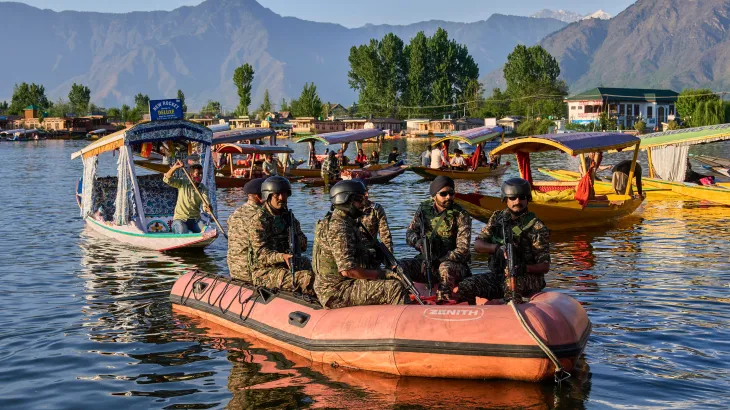Kashmir Attack: India and Pakistan Trade Fire as Gunmen Sought in Pahalgam
Published: April 26, 2025
Tensions have escalated sharply between India and Pakistan after gunmen killed 26 civilians in Indian-administered Kashmir’s popular Pahalgam region earlier this week. Indian and Pakistani troops have exchanged fire across the Line of Control (LoC) for a second consecutive day as the two nuclear-armed nations confront each other over the deadly attack.
The assault, which took place on April 24, saw a group of unidentified gunmen storming a civilian gathering in Pahalgam, killing at least 26 people and injuring dozens more. Indian authorities immediately blamed Pakistan-based militants for carrying out the attack, describing it as one of the deadliest in recent memory. The assailants remain at large, and security forces in Kashmir have launched a full-scale manhunt.
“This attack was a well-coordinated operation with clear intent to destabilize the region. We hold Pakistani-based groups responsible,” an Indian security official told Asia Fronts on condition of anonymity. Indian intelligence has reportedly intercepted communications that suggest the attack was planned across the LoC, in Pakistan-administered Kashmir.
The violence has sparked a series of retaliatory actions. Indian and Pakistani forces began firing across the LoC on April 25, with both sides accusing the other of violating the ceasefire that had held for most of the last four years. Shelling and small-arms fire continued for hours, with reports from both sides indicating significant damage to property and infrastructure. No casualties have been confirmed yet from the clashes along the border.
Pakistan Responds
In response, Pakistan’s Prime Minister Shehbaz Sharif has strongly denied any involvement in the attack, calling the Indian accusations baseless. In an address to the nation on Friday, Sharif emphasized that Pakistan is committed to defending its sovereignty but also expressed willingness to cooperate in a neutral international investigation into the incident.
“We are prepared to defend our country, but we also stand by the need for transparency,” Sharif said. “We welcome any neutral, international probe that could uncover the truth behind this attack.”
Sharif’s statement marks a rare moment of diplomacy amid rising tensions, and it is seen by some analysts as an attempt to de-escalate the situation before it spirals into a larger conflict. However, the Indian government has yet to comment on the offer for an international investigation, and tensions remain high on both sides.
A Region in Turmoil
Kashmir has long been a flashpoint between India and Pakistan, with both countries claiming the region in full but administering separate parts. The territory has witnessed repeated bouts of violence and military confrontations since both nations gained independence from Britain in 1947.
This latest attack comes at a particularly volatile time. The region has been under a heavy military presence for years, with security forces often engaging in violent confrontations with militant groups. Yet the scale of the Pahalgam massacre has shocked many, as the gunmen targeted civilians rather than military personnel, heightening fears that the attack could signal a new phase of violence.
The ongoing military exchanges have placed local populations on edge. “We are all living in fear. People are afraid to leave their homes,” said Mohammad Khan, a resident of Uri, a village near the LoC. Authorities have already evacuated several villages on both sides of the border and imposed curfews in high-risk areas. In addition, internet services have been cut off across much of the region to prevent the spread of misinformation.
Humanitarian Concerns
Human rights organizations have raised concerns about the civilian toll of both the initial attack and the subsequent military actions. The South Asia Human Rights Forum called for restraint, urging both sides to adhere to international conventions and protect civilian lives during periods of military conflict.
“We are witnessing a dangerous escalation. Both countries must prioritize de-escalation and dialogue rather than further violence,” the forum stated in a press release.
As the hunt for the attackers intensifies, fears of broader conflict between India and Pakistan continue to loom large, with the international community watching closely. The situation remains fluid, and both governments are under immense pressure to avoid an all-out confrontation.
#Kashmir #GHHL #IndiaPakistan #Pahalgam #LoC #KashmirConflict #Pakistan #India #CrossBorderFiring #TerrorAttack #SouthAsia #KashmirCrisis

